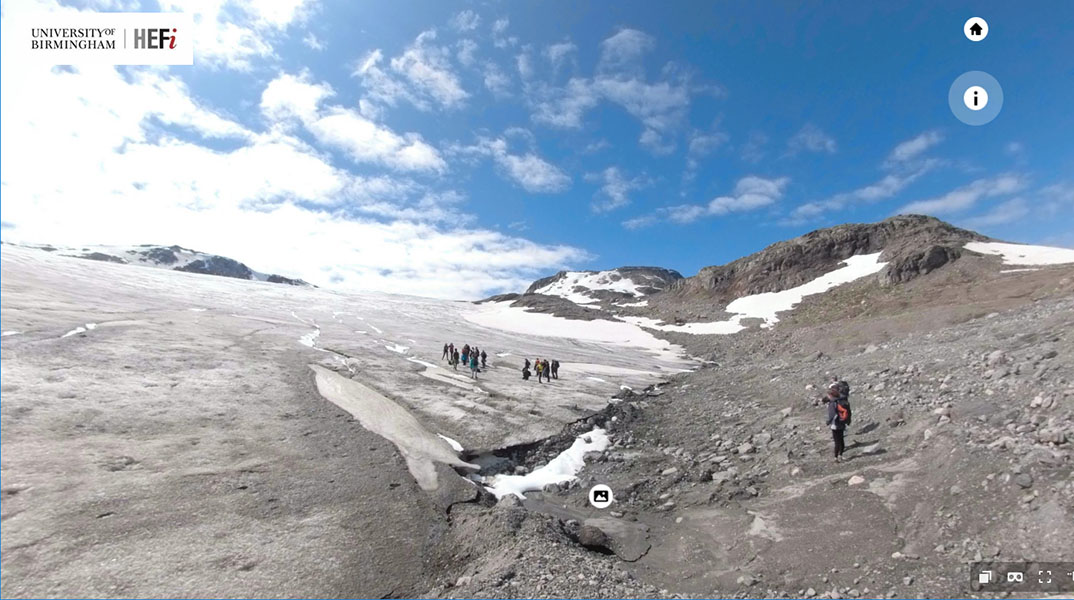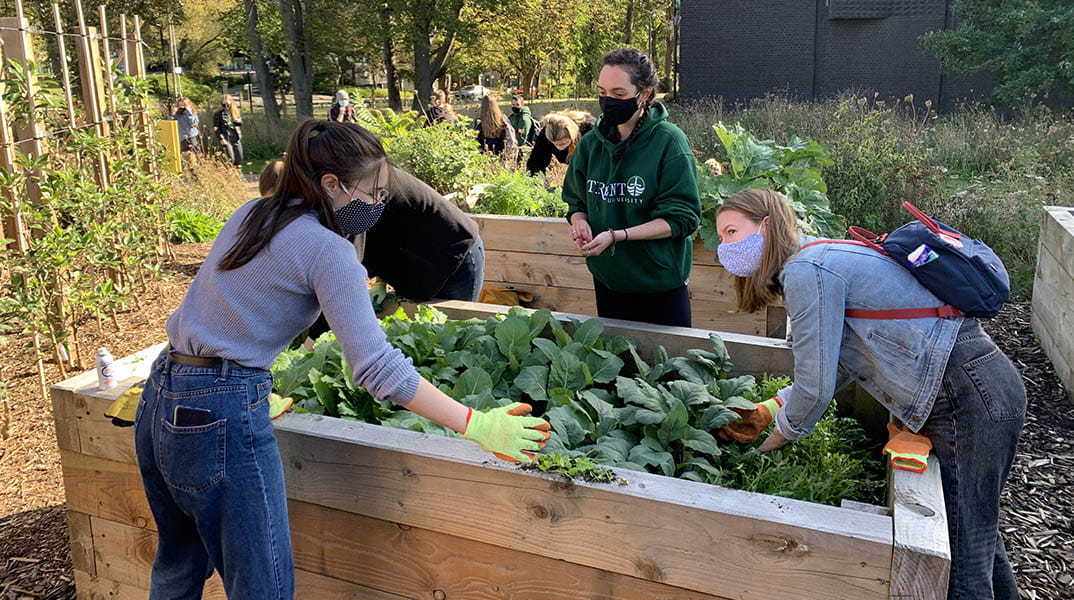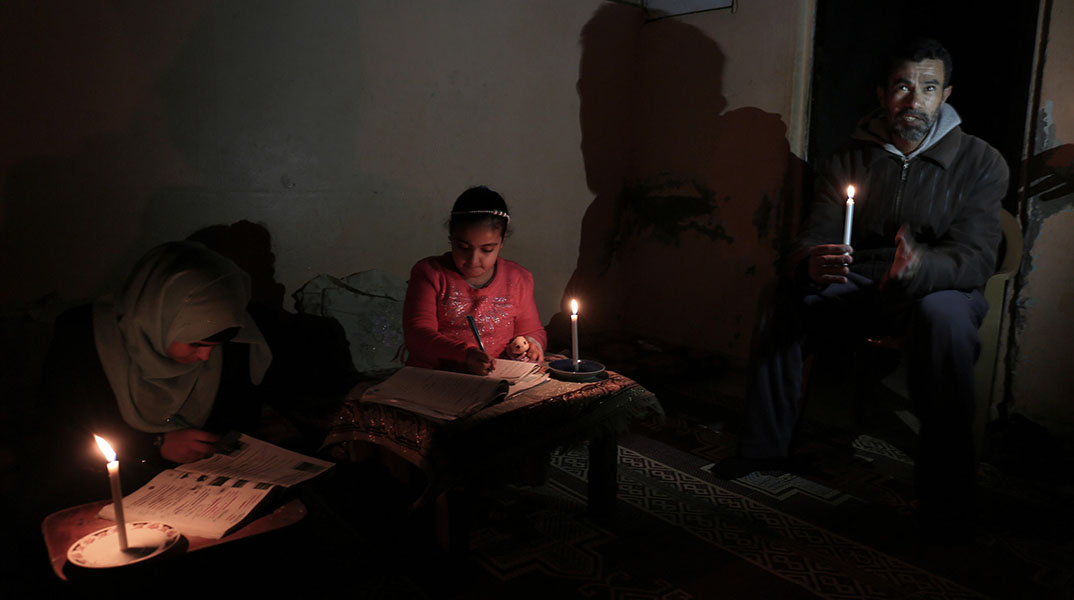-

Virtual cliffhanger
The University's Higher Education Futures institute (HEFi) has been creating virtual field trips for a number of years to allow students who cannot attend physical trips to visit the locations. This year all field trips were cancelled, and the virtual versions were fundamental in delivering a range of courses.
One regular field trip for students is to the Hardangerjøkulen glacier in Norway, 6,000 feet above sea level in an area inaccessible by road. This presented a particular challenge to the HEFi team, who hiked to the glacier carrying cameras, tripods and microphones. Joe Berry, Head of HEFi Digital in the College of Life and Environmental Sciences, says: 'Luckily the weather was clear, allowing us to capture some amazing 360-degree scenes.
'Back in Birmingham we worked with Professor Jeremy Pritchard to build content into the scenes, revealing details of the geology and ecology of the area. Students can also perform a sampling exercise, counting the number of species as they move away from the glacier.' -

Band on the run
A system that will enable musicians to play alone, but as if part of a live ensemble, is being developed at the University.
In situations where musicians are unable to be together, the Augmented Reality Music Ensemble (ARME) will offer the experience of a group rehearsal. Being unable to meet has been an issue for musicians throughout the pandemic and is an ongoing challenge for players looking to explore and rehearse music without access – for whatever reason – to their colleagues.
The system is being developed by a collaborative team led by Birmingham researchers as well as Birmingham City University and the University of Warwick, and PartPlay and Semantic Audio, two UK companies specialising in digital music technology.
ARME presents the lone musician with a group of virtual colleagues based on audio-visual recordings of professional players. Each virtual player is timing-sensitive, meaning their musical is individually modulated in real time. The sensitivity allows for the virtual musicians to synchronise "live" with each other, and with the real player, simulating the rehearsal experience. -

Green fingers in the Green Heart
Community compost bins have been installed in the Green Heart community garden known as "Grow with Joe" are promoting local food production.
The garden is run by student volunteers from the Conservation Volunteers Society and is now in its third year of production. The garden project was established to encourage students, staff and members of the wider community to become interested in local food production. It has received support from the Alumni Impact Fund, made up of generous donations from our alumni community.
The insulated bins will provide a clean receiver for staff and students to deposit their organic food waste, such as vegetable peelings, eggshells and biodegradable tea bags. The main aim is to teach members of the community about organic food and its benefits, to reduce waste from students and staff and to make the project more self-sustaining.
Ongoing maintenance of the project will be managed by staff and student volunteers from the University of Birmingham Conservation Volunteers student group. -

Taking air pollution research mobile
University scientists will be using new mobile air quality research laboratories to analyse how air pollution is formed and its impact on the environment and people in the UK.
Scientists at the Universities of Birmingham, Manchester, Cranfield and Coventry, Imperial College London and Aston University have secured funding from the Natural Environment Research Council (NERC) in the UK for two "supersite observatories" –fixed in an electric van and a trailer. They will dovetail with existing fixed air quality supersites in Birmingham, London and Manchester.
Urban Air Quality Supersites already allow researchers to gather detailed data on the contents of harmful urban air pollution; working out where the gases and particles that pollute our air are coming from and how they form in the air.
As part of the drive to improve regional and national air quality, the mobile supersites will help scientists better understand the balance between traffic and urban emissions, and pollutants already present in the air and carried on the wind into urban areas.
They will also help to define how chemical processing agricultural emissions and changes to move towards carbon-zero transport affect air quality. -

Speedy smiles
The speed at which we produce facial expressions plays an important role in our ability to recognise emotions in others, according to new University research.
A team in the School of Psychology carried out research that showed people tend to produce happy and angry expressions more rapidly, while sad expressions are produced more slowly.
The team found that our ability to form judgements about people’s facial expressions has close links with the speeds at which those expressions are produced and is also closely related to the ways in which we would produce those expressions ourselves. The study is published in Emotion.
'Being able to recognise and interpret facial expressions is a vital part of social interaction,' explains lead author Dr Sophie Sowden. 'While we understand the spatial characteristics of an expression – the way the mouth moves in a smile, for example – the speeds at which expressions are produced are often overlooked.
'The ability to pick up on and rapidly interpret these cues could also help people to judge facial expressions even when mask-wearing might limit other visual cues.
'Better understanding how people interpret this important visual cue could give us new insights into the diagnosis of conditions such as Autism Spectrum Disorder or Parkinson's Disease. This is because patients with these conditions often recognise facial expressions differently, or exhibit expressions differently.' -

Living with no sense of touch
Evidence that a sense of our physical selves can develop even without the sense of touch has been uncovered in a new study by researchers in the UK and the United States.
The research shows that if someone loses their sense of touch and their sense of body position – as an adult, they may learn compensatory skills using visual cues and conscious thought, or reasoning, to move their bodies. However, someone who has never had a sense of touch or body position, can find faster, unconscious ways of processing visual cues to move and orient themselves.
A team at Birmingham collaborated with researchers at Bournemouth University and the University of Chicago on the study, published in Experimental Brain Research.
The team worked with two individuals – Ian and Kim – who have had unique sensory experiences: Ian developed a complete loss of tactile sense and sense of body position below his neck after an autoimmune response to an illness. Kim was born without either sense, lacking the sensory nerve fibres needed to feel her body. -

Spotting suspects
Experts have devised a novel approach to selecting photos for police line-ups that helps witnesses identify culprits more reliably.
Researchers from Birmingham in the UK and the University of California San Diego and Duke University in the United States found that selecting extra people to complete a line-up (“fillers”) who match a basic description of the suspect but whose faces are less similar – rather than more – leads to 10 per cent better eyewitness performance than traditional approaches in the field.
While police may err on the side of picking facially similar fillers for line-ups, the study showed it is actually better to pick those who are facially dissimilar. Importantly, this approach did not have any effect on the number of “false alarms,” in which an innocent suspect is incorrectly identified.
The new approach relied on insights from signal detection theory, which considers the memory strengths that are generated by each face in the line-up in the mind of the eyewitness. -

Here comes the sun
A Birmingham team is developing a novel solar energy pilot plant that will help provide clean and affordable electricity to people living in Gaza.
Those living in Gaza receive less than six hours of power per day, meaning even vital services such as hospitals can only provide critical functions.
University researchers and their counterparts at the Islamic University of Gaza are combining two efficient technologies in a new way to produce electricity.
The new system is robust, easy to install, operate and maintain without the need to depend on the national grid, in a region with an abundant amount of solar energy available.
Project leader Dr Raya Al-Dadah, Reader in Sustainable Energy Technologies at the University of Birmingham, says: 'Our pilot plant will provide electricity for 30 households - enabling the environmental health and human geography teams from Birmingham and Gaza to assess the impact of electricity availability on family health, wellbeing and gender equality. We can learn valuable lessons on how wellbeing improves by applying the new technological solution.'